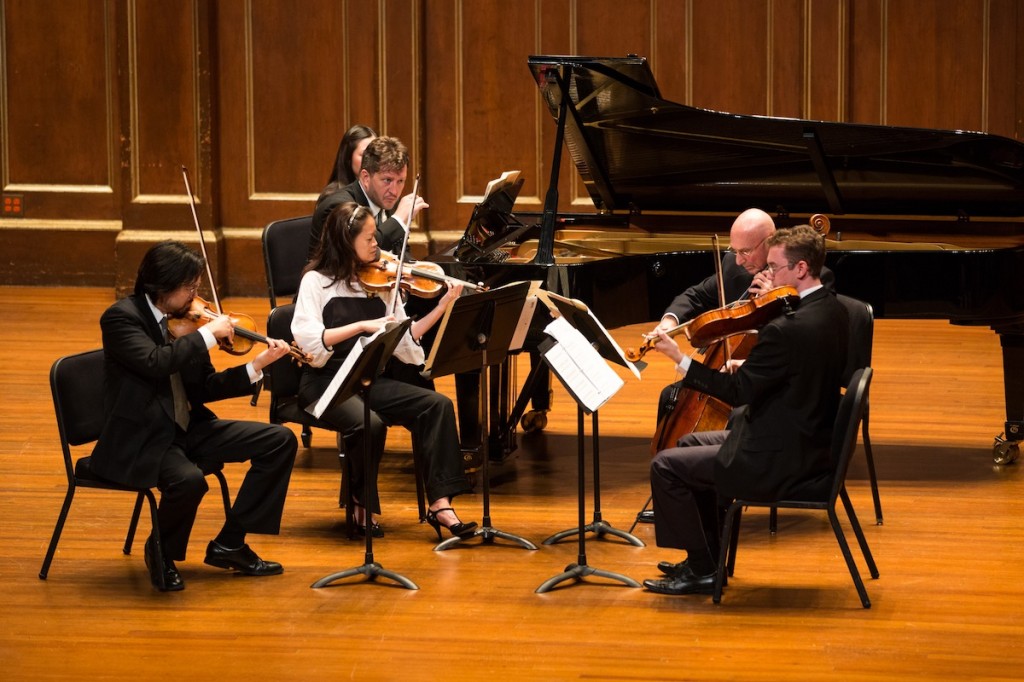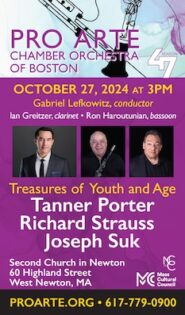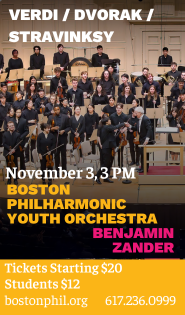Adès, BSO members celebrate 50 years of chamber music
In case concertgoers weren’t getting enough of the English composer-conductor-pianist Thomas Adès during his podium appearances this weekend with the Boston Symphony Orchestra, the Boston Symphony Chamber Players provided a triple dose in New England Conservatory’s Jordan Hall Sunday afternoon.
Not only were two intriguing Adès chamber works on the bill, but the man himself was at the keyboard for three-quarters of the program. Despite the visitor’s large physical presence onstage, there was a distinct French accent, a certain fastidiousness, to the whole occasion—at least until the final piece, Adès’s robust Piano Quintet, came along to rattle the chandeliers.
It seemed a point was being made, as the BSO players opened their 50th anniversary season with a concert devoted to the works and musical interests of a composer who, born in 1971, is younger than the chamber series itself.
Adès, now one of his country’s most lionized composers, was still something of a new discovery back in 1993, when he composed the Sonata da Caccia, Op. 11, for an odd ensemble—oboe, horn, and harpsichord—that might seem to be something out of P.D.Q. Bach. (Debussy actually planned a work for the same forces but never wrote it.)
Adès’s “hunting sonata” owed little to Debussy in style, except the delicate whimsicality with which it handled its actual predecessor, the trio sonatas of Couperin. From the poetic adverbs of its movement markings (“Gravement,” “Naïvement,” and so on) to the graceful phrases of its themes, this piece seemed to channel the Baroque master even as it reflected him in a drolly distorting mirror.
At the outset, this combination of instruments posed exactly the problems of balance one would imagine. James Sommerville tried manfully to suppress his horn tone, with attendant difficulties keeping the notes from cracking, while John Ferrillo’s full, piercing oboe tone easily eclipsed the tinkling of Adès at the harpsichord. (The score lists the softer Baroque oboe as an option; it should perhaps be mandatory.)
The balance situation improved as the four movements unfolded and the harpsichord part became more assertive. The harpsichordist also asserted himself, conducting his two colleagues whenever he had a hand free—a composer’s prerogative, to be sure, but maybe best left in the rehearsal room.
The first three movements—a fractured adagio, allegro, and pastorale—were performed almost continuously. In a last humorous touch, a long pause for foot shuffling, music-stand tending, and instrumental moisture management preceded a finale that seemed to last only about a minute and a half, with the horn freed at last to razz the oboe’s decorous melody.
Debussy’s Sonata for Flute, Viola, and Harp, one of his last compositions, was chamber music for a very small chamber. Although each of the three instruments has enough inherent power to carry over an orchestra, Debussy used them with utmost discretion in this three-movement work.
Flutist Elizabeth Rowe and violist Cathy Basrak played standing rather than sitting, a choice some players say enhances their sense of freedom and physical involvement with the music. Certainly intimacy and nuance were the hallmarks of these artists’ playing Sunday, Rowe adopting a round yet pastel-hued flute tone, and Basrak gracefully inhabiting the “middle sibling” role between flute and harp.
Jessica Zhou’s harp was the key to the sonata’s fleeting moods, exploring a marvelous variety of timbres within a modest dynamic range. And there were many moods to keep up with, as Debussy, like Adès in the preceding work, riffed fantastically on his Baroque models of Pastorale, Tempo di Minuetto, and Finale.
Ravel’s Chansons madécasses for voice, flute, piano, and cello is also a late work, economical of means but red-blooded in content. Baritone John Brancy, a recent Juilliard graduate and winner of competitions and career-builder awards, showed lots of heft and focus vocally, but a bit too much emotional reserve at first; his performance of the sensually explicit first song, “Nahandove,” ran no risk of being banned in Boston.
Brancy’s strength leaped to the fore, however, in the piercing shout of “Aoua!” that opened the second song, “Méfiez-vous des blancs” (Don’t trust the white men), after which he roared out the rage of a colonized people, easily topping pianist Adès, who was holding nothing back at the wide-open concert grand, and the menacing cries of flutist Rowe and cellist Jules Eskin.
Singer and ensemble then evoked a scene of more sublimated sensuality: sitting in the shade on a sweltering afternoon, the poet watches women braid their hair, shoo birds from the rice field, and prepare the evening meal. As Adès and Eskin made their instruments shimmer with the heat, Rowe set the scene in a lush solo, then engaged the baritone in a languid duet.
When Adès appeared on this chamber series last season, the program included Brahms’s muscular Piano Quintet, Op. 34 (with Kirill Gerstein, not Adès, at the piano). A healthy dose of that Romantic aesthetic—massed strings flung against a two-fisted piano—animated Adès’s own Piano Quintet, composed in 2001 and serving Sunday as a kind of wake-up call to this dreamy afternoon of poetic chamber music.
Other Brahmsian features included distinctive themes in a state of near-constant variation and development, and a clear recapitulation of those themes at about the midpoint of the one-movement, 20-minute work.
The material poured into this traditional mold, however, was pure, expect-the-unexpected Adès: strings moving together for long stretches, then shattering into every-which-way pizzicato, or the piano booming one minute and weaving a gauzy atmosphere the next, or instruments playing in a fistful of different meters at the same time.
Adès proved a proficient pianist, showing occasional flashes of brilliant technique but mostly supporting (and conducting) the group. In their tonal blend and coordination, the pick-up BSO ensemble—violinists Haldan Martinson and Elita Kang, violist Mark Berger, and cellist Eskin—played like the established quartet (the Arditti) for which Adès wrote the piece.
The three subsequent concerts of this anniversary season will feature works familiar, unfamiliar, and commissioned for the occasion. The vigorous C-major conclusion of Thomas Adès’s Piano Quartet on Sunday gave just the right backward-and-forward-looking push to the whole enterprise.
The Boston Symphony Chamber Players will perform works of Copland, Fine, Mozart, and Brahms January 12, 2014 at Jordan Hall. bso.org; 617-266-1200.
Posted in Performances


